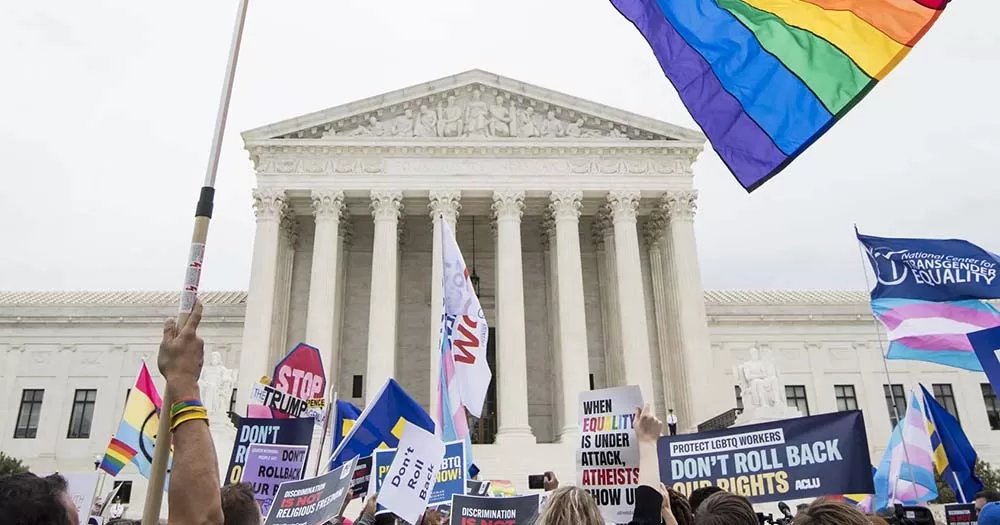On Friday, June 30, the US Supreme Court voted 6-3 in favour of allowing certain businesses to refuse to serve LGBTQ+ customers, making it the first time in history that a public business can legally refuse service based on a customer’s sexual orientation.
Despite a state law prohibiting discrimination against LGBTQ+ people, the justices sided with Colorado web designer Lorie Smith, who claimed she has a First Amendment right to refuse to design wedding websites for same-sex couples because of her Christian beliefs.
Conservative justices supported Smith, with Justice Neil M. Gorsuch, writing for the majority, saying that the First Amendment protected the designer, from being compelled to express views she opposed.
Dissenting justices called the ruling a “license to discriminate” since businesses can now refuse LGBTQ+ clients. Justice Sonia Sotomayor wrote, “Today, the Court, for the first time in its history, grants a business open to the public a constitutional right to refuse to serve members of a protected class.”
“Today is a sad day in American constitutional law and in the lives of LGBT people. The Supreme Court…declares that a particular kind of business, though open to the public, has a constitutional right to refuse to serve members of a protected class.”
–JUSTICE SONIA SOTOMAYOR pic.twitter.com/SbIutYSKKc
— The Leadership Conference (@civilrightsorg) June 30, 2023
While framed as a free speech case, activists are worried the ruling will have dangerous repercussions for LGBTQ+ people and other marginalised groups.
Human Rights Campaign President Kelley Robinson released a statement calling Friday’s Supreme Court ruling “a deeply troubling crack in our progress and should be alarming to us all,” adding, “The LGBTQ+ community is in a state of emergency where all levels of government are trying to erase us, but we will not let them erase us—we will fight back.”
BREAKING: The Supreme Court has ruled that certain businesses have a right to discriminate when selling customized, expressive services.
This is the first time the Court has permitted a business open to the public to turn away customers in defiance of a nondiscrimination law.
— ACLU (@ACLU) June 30, 2023
US President Joe Biden fears the ruling will invite further discrimination, saying: “In America, no person should face discrimination simply because of who they are or who they love.”
Vice President Kamala Harris tweeted: “The Supreme Court has paved the way for businesses to discriminate against the LGBTQI+ community, racial and religious minorities, the disability community, and women.”
The Supreme Court has paved the way for businesses to discriminate against the LGBTQI+ community, racial and religious minorities, the disability community, and women.
Know this: @POTUS and I will continue to enforce federal anti-discrimination protections.
— Vice President Kamala Harris (@VP) July 1, 2023
Vocal LGBTQ+ ally Pedro Pascal also called out the justices who supported the case by posting a photo of the Supreme Court justices with Pride and trans flags on his Instagram stories.
The court’s vote represents the latest decision in a series of cases that ruled in favour of conservative Christian groups. In the past year, the US Supreme Court’s 6-3 supermajority has overturned Roe v Wade, ended affirmative action in university admissions and rejected President Joe Biden’s $400 billion plan to cancel federal student loan debts.
While the Supreme Court decision has been widely condemned, The New Republic suggests that the case may have been based on a fabricated request.
According to its research, the name, address, and contact information of the plaintiff in the case were fake. Furthermore, the allegedly gay man who apparently asked Smith to design a wedding website is, in fact, a straight man who is married to a woman, and he denies the claims.
It is possible that the court’s decision will be revisited if it was based on a fake claim.
© 2023 GCN (Gay Community News). All rights reserved.
Support GCN
GCN is a free, vital resource for Ireland’s LGBTQ+ community since 1988.
GCN is a trading name of National LGBT Federation CLG, a registered charity - Charity Number: 20034580.
GCN relies on the generous support of the community and allies to sustain the crucial work that we do. Producing GCN is costly, and, in an industry which has been hugely impacted by rising costs, we need your support to help sustain and grow this vital resource.
Supporting GCN for as little as €1.99 per month will help us continue our work as Ireland’s free, independent LGBTQ+ media.

comments. Please sign in to comment.